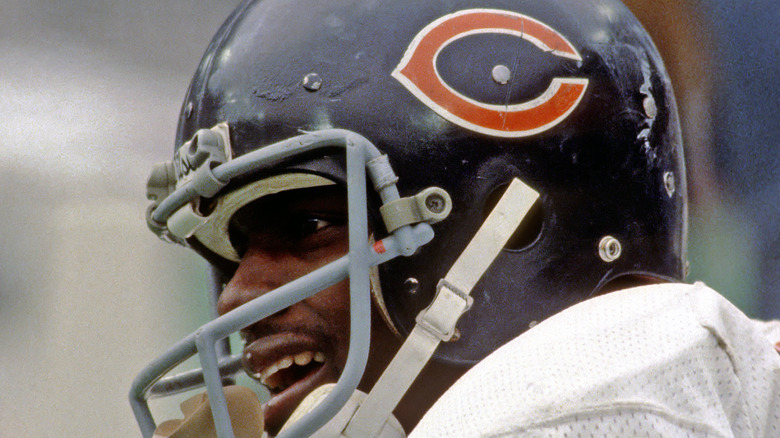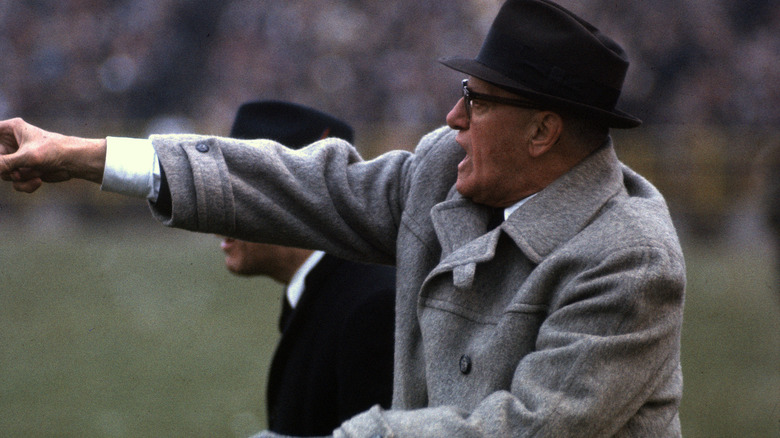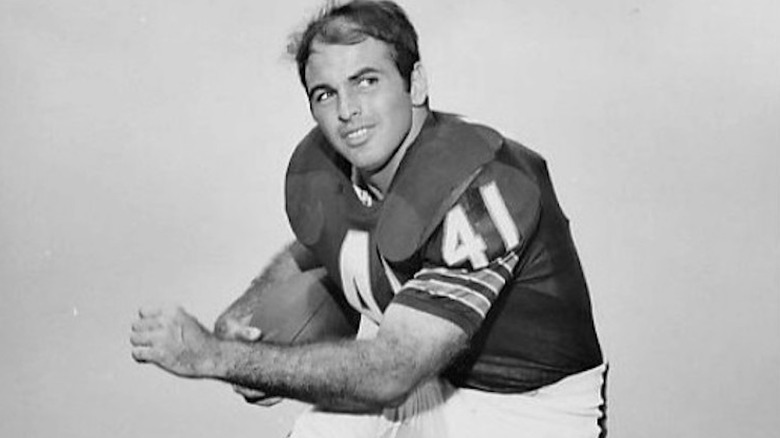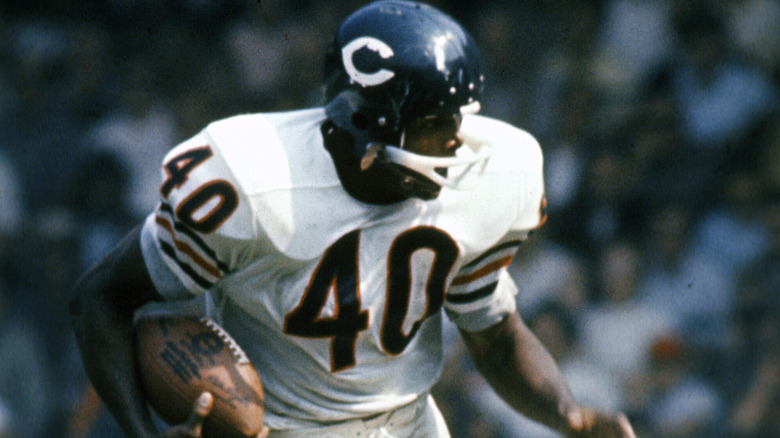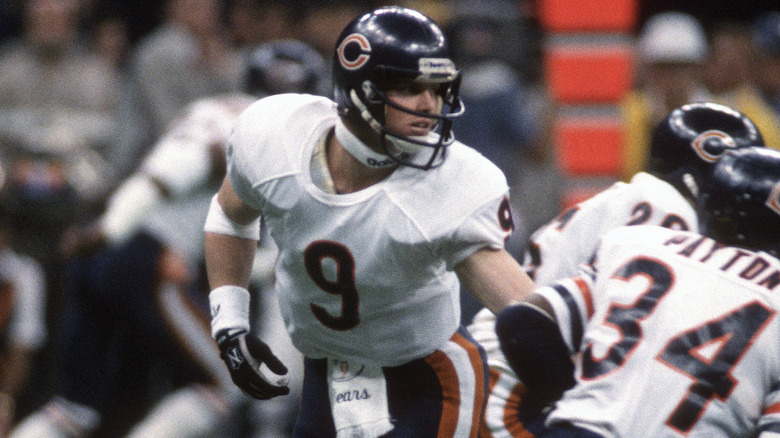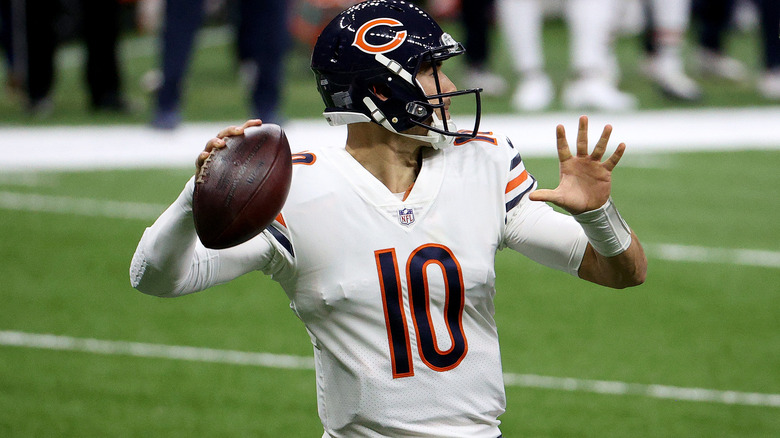Tragic History Of The Chicago Bears
The Chicago Bears are one of the NFL's oldest franchises, with a rich history that dates back to the very start of the league in 1920. Back then, they were briefly known as the Decatur Staleys, and the NFL was then known as the American Professional Football Association (APFA) — needless to say, those names don't exactly roll off the tongue. In the 100-plus years since their humble beginnings with George Halas as their owner, founder, coach, and (no joke) star player, the Bears have won championships, sent iconic players to the Hall of Fame, and even had some of those iconic players and their teammates rap, dance, and pretend to play musical instruments on the now-immortal "Super Bowl Shuffle." Good thing they all decided to stick to their day jobs ... and actually win Super Bowl XX while at it.
As you can certainly expect from a franchise that's been around for more than a century, the Bears' history is also marked by a number of tragedies, as well as challenging moments or stretches that have seen the team struggle in one area or another, or lose some on-field standouts to retirement well before anyone expected them to hang up their cleats.
George Halas failed to sign the first-ever No. 1 draft pick in NFL history
Back in its earliest days, the NFL Draft was far from the days-long spectacle we've come to expect toward the end of April. It was a much simpler event to match the simpler times, but even then, it was the worst team that got to pick first. The Philadelphia Eagles, who brought up the rear in the 1935 NFL season with a 2-9 record, selected University of Chicago halfback Jay Berwanger — the first-ever Heisman Trophy winner, no less — with the first pick in the 1936 draft, but quickly traded his rights to the Chicago Bears. Naturally, owner-coach George Halas (pictured above in the early '60s) was dead-set on signing the hometown hero, but in the end, he wasn't able to meet Berwanger's contract demands.
According to a 1940 article from the Berkeley Daily Gazette, Berwanger was insistent on receiving $15,000 from the Bears (talk about simpler times), but Halas didn't want to go a cent over $13,500. It was only a small difference, but both sides wouldn't budge; in 1937, the former college football star was still sending out feelers in hopes that "Papa Bear" would meet his contract demands. But when Halas still refused, Berwanger opted for a career as a foam rubber salesman (via History). He also worked as a referee and as an assistant coach in the college ranks, but never did he play a down of professional football.
The short and tragic life of Bears RB Brian Piccolo
Despite leading the nation in rushing and scoring as a senior at Wake Forest (via ESPN), Brian Piccolo's name was not called in the 1964 NFL Draft. As a free agent running back thought to be too small and slow for the pros, Piccolo was signed by the Chicago Bears, where he made his way from the taxi squad (i.e. practice team) and became a competent backup to superstar halfback Gale Sayers, even starting several games in 1968 when Sayers suffered a season-ending injury (via Bears History). In 1969, however, he was slowed down by a persistent cough and chest pains and was soon found to have embryonal cell carcinoma, a rare form of cancer that eventually spread to other organs. Piccolo was only 26 years old when he died on June 2, 1970.
Although not a superstar by any stretch of the imagination, Piccolo's work ethic and courage in the face of adversity forever ensured his place among the most notable players to ever wear a Bears uniform. His short life, as well as his then-unusual friendship with Black teammate Sayers at a time of racial unrest in America, became the basis of the 1971 made-for-television biopic "Brian's Song," which respectively starred James Caan and Billy Dee Williams as Piccolo and Sayers. The Bears also honored the late running back through the Brian Piccolo Award, which is presented to the "rookie and veteran who best exemplify the courage, loyalty, teamwork, dedication and sense of humor" he exemplified during his time with the team, per ESPN.
Two of their biggest stars of the '60s retired way too early
The Chicago Bears weren't short on star power in the 1960s, but we should also note that two of their biggest stars that decade had much shorter careers than what you'd expect from players of their caliber. Gale Sayers was an instant superstar at running back for Chicago, as he scored a then-NFL-record 22 touchdowns from scrimmage en route to the Rookie of the Year award (via ESPN). He would also lead the league in rushing yards twice and get selected to the Pro Bowl in each of his first five seasons. Tragically, he suffered multiple serious knee injuries, and he was 28 years old when he played his last NFL game in 1971 — way too young to call it quits had he been healthy.
During that same 1965 NFL Draft where Sayers was chosen fourth overall, linebacker Dick Butkus was taken with the third pick, and he likewise wasted no time dominating on defense for the Bears. He was a regular All-Pro selection who led the Bears in tackles for eight consecutive seasons, and running backs cowered in fear at the mere sight of No. 51 stepping on the field. However, his hard-hitting, take-no-prisoners style of play ultimately caught up with him, and he was just 31 when he retired after the 1973 season.
Multiple players from the Bears' 1985 championship team faced challenges later in life
The Chicago Bears of the mid-'60s to early '70s may have boasted stars like the aforementioned Gale Sayers and Dick Butkus, but as their Pro Football Reference franchise history page shows, those teams weren't very good overall. In fact, it wasn't until the mid-'80s that they once again became consistent contenders — the peak of this period, undoubtedly, came when the 1985 Bears defeated the New England Patriots, 46-10, at Super Bowl XX. Unfortunately, life away from football hasn't been kind (or wasn't kind) to many of the top players on this championship-winning unit.
Walter Payton, the bruising running back ironically nicknamed "Sweetness," was just 45 when he died of cancer in 1999, and while he was a beloved player on the field, his 2011 biography, "Sweetness: The Enigmatic Life of Walter Payton" painted the picture of a flawed man who secretly dealt with depression and abused pain medication even after he retired (via ESPN). Over a decade later, Pro Bowl safety Dave Duerson died by suicide at 50 in February 2011, leaving a note asking that his brain be studied for the possibility of CTE.
It also hasn't been easy for the likes of William "Refrigerator" Perry, the charismatic, touchdown-scoring defensive lineman, and Jim McMahon, the hard-partying "punky QB" who was nonetheless a talented signal-caller for the Bears. Perry's health and financial problems have been well-documented through the years, while McMahon, who suffered a string of concussions and other injuries during his playing career, was diagnosed with early-onset dementia in the late 2000s (via USA Today).
If you or anyone you know is having suicidal thoughts, please call the National Suicide Prevention Lifeline at 1-800-273-TALK (8255).
They haven't had the best track record drafting quarterbacks since the late '90s
A look at the Chicago Bears' draft history on Pro Football Reference will tell you that it's been a while since they drafted a first-round quarterback who went on to have a successful NFL career — that would be Jim Harbaugh, who was picked 26th in 1987 and went on to greater fame as a coach after playing 14 pro seasons. Twelve years later, they selected Cade McNown with the 12th pick in the 1999 draft, and he was a flop, gone after two mediocre seasons. Rex Grossman went 22nd overall in 2003 and led Chicago to an appearance at Super Bowl XLI, but spent most of his nine-year NFL career as a backup.
In 2017, Chicago had the No. 2 overall pick in the NFL Draft, and they used it on Mitchell Trubisky, who, in all fairness, had more than decent numbers during his time with the Bears. But statistics don't tell the whole story when evaluating a player, and they can often be misleading; Sports Mockery cited analytics from Sports Info Solutions, observing that Trubisky, despite his solid numbers in the 2020 season, whiffed on too many easy plays. It's also worth mentioning that the Bears selected Trubisky eight spots ahead of Patrick Mahomes, who went to the Kansas City Chiefs and led them to a championship at Super Bowl LIV.
The jury is still out on Justin Fields, the latest first-round QB drafted by the Bears (at No. 11 overall), but just like all 2021 rookie quarterbacks not named Mac Jones or Davis Mills, his debut season in the NFL hasn't been anything to write home about. Bears fans can only hope he doesn't follow in the footsteps of McNown or Grossman.
